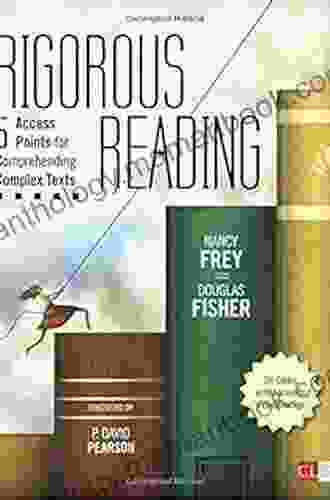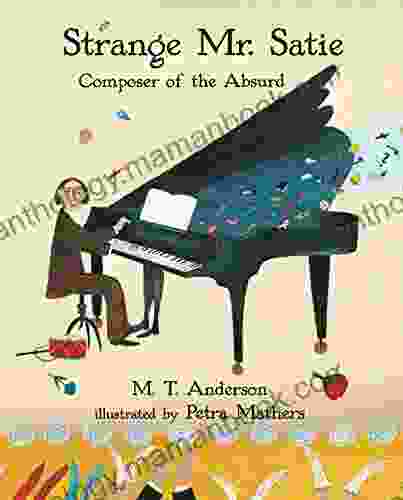Access Points: Unlocking the Interpretation of Complex Texts with Confidence

In the realm of education, the ability to comprehend complex texts is paramount for academic success and lifelong learning. However, the intricacies of language and the challenges of interpreting dense materials can often leave students feeling bewildered and unmotivated. Enter the revolutionary concept of Access Points, a groundbreaking approach that empowers students to navigate the complexities of text comprehension with confidence and enthusiasm.
4.6 out of 5
| Language | : | English |
| File size | : | 10814 KB |
| Text-to-Speech | : | Enabled |
| Enhanced typesetting | : | Enabled |
| Word Wise | : | Enabled |
| Print length | : | 256 pages |
| Screen Reader | : | Supported |
| X-Ray for textbooks | : | Enabled |
Access Points: A Gateway to Textual Understanding
Access Points are strategic entry points into complex texts that provide students with a scaffolding of support and guidance. By identifying key concepts, providing background knowledge, and offering contextual cues, Access Points serve as bridges that connect students' prior knowledge with the unfamiliar terrain of challenging texts.
1. Textual Evidence as a Foundation
One of the cornerstones of Access Points is the emphasis on textual evidence. By strategically selecting excerpts from the text, teachers can provide students with concrete examples that illustrate key concepts and relationships. These textual anchors serve as a foundation upon which students can build their understanding and make meaningful connections.
2. Prior Knowledge: Bridging the Gap
Access Points recognize the importance of prior knowledge in the comprehension process. By tapping into students' existing knowledge and experiences, teachers can create connections between the known and the unknown. This act of bridging the gap between familiarity and novelty fosters a sense of relevance and engagement.
3. Contextual Cues: Illuminating the Meaning
Contextual cues play a crucial role in unlocking the meaning of complex texts. Access Points provide a rich tapestry of contextual information, including historical background, cultural references, and literary devices. These cues illuminate the author's intent and create a deeper understanding of the text's context and purpose.
Benefits of Access Points: A Path to Deeper Comprehension
The incorporation of Access Points into teaching practices has been proven to yield a myriad of benefits for students:
- Enhanced Comprehension: Access Points provide a structured and supportive framework that enables students to grapple with complex texts more effectively, leading to a deeper understanding of the content.
- Improved Critical Thinking: By engaging with textual evidence and contextual cues, students develop critical thinking skills as they analyze, synthesize, and evaluate information.
- Increased Motivation: Access Points make complex texts more accessible and engaging, fostering a sense of accomplishment and motivation among students.
- Reduced Anxiety: By providing a clear path to understanding, Access Points alleviate anxiety and build confidence in students as they approach challenging texts.
- Equity and Inclusivity: Access Points create an equitable learning environment by providing all students, regardless of their background or reading ability, with the tools and support they need to comprehend complex texts.
Implementing Access Points: A Guide for Teachers
To effectively implement Access Points in the classroom, teachers can follow these steps:
- Identify Textual Complexity: Assess the difficulty of the text and determine which sections may pose challenges for students.
- Create Strategic Excerpts: Select key passages that provide exemplars of important concepts and relationships.
- Provide Background Knowledge: Share relevant information about the author, historical context, and cultural references to enhance students' understanding.
- Facilitate Discussion: Guide students in analyzing the textual evidence, making connections, and drawing inferences.
- Monitor Progress: Regular check-ins and formative assessments help teachers gauge students' comprehension and adjust their instruction accordingly.
: Access Points as a Catalyst for Comprehension
In the ever-evolving landscape of education, Access Points emerge as a transformative strategy for empowering students to comprehend complex texts with confidence and enthusiasm. By providing strategic entry points, bridging prior knowledge, and illuminating context, Access Points unlock the gates of understanding and foster a lifelong love of learning. As educators, it is our responsibility to embrace this innovative approach and equip our students with the tools they need to navigate the complexities of the textual world. By ng so, we not only enhance their academic journey but also cultivate critical thinkers and lifelong learners who are prepared to engage with the complexities of our rapidly changing world.
4.6 out of 5
| Language | : | English |
| File size | : | 10814 KB |
| Text-to-Speech | : | Enabled |
| Enhanced typesetting | : | Enabled |
| Word Wise | : | Enabled |
| Print length | : | 256 pages |
| Screen Reader | : | Supported |
| X-Ray for textbooks | : | Enabled |
Do you want to contribute by writing guest posts on this blog?
Please contact us and send us a resume of previous articles that you have written.
 Top Book
Top Book Novel
Novel Fiction
Fiction Nonfiction
Nonfiction Literature
Literature Paperback
Paperback Hardcover
Hardcover E-book
E-book Audiobook
Audiobook Bestseller
Bestseller Classic
Classic Mystery
Mystery Thriller
Thriller Romance
Romance Fantasy
Fantasy Science Fiction
Science Fiction Biography
Biography Memoir
Memoir Autobiography
Autobiography Poetry
Poetry Drama
Drama Historical Fiction
Historical Fiction Self-help
Self-help Young Adult
Young Adult Childrens Books
Childrens Books Graphic Novel
Graphic Novel Anthology
Anthology Series
Series Encyclopedia
Encyclopedia Reference
Reference Guidebook
Guidebook Textbook
Textbook Workbook
Workbook Journal
Journal Diary
Diary Manuscript
Manuscript Folio
Folio Pulp Fiction
Pulp Fiction Short Stories
Short Stories Fairy Tales
Fairy Tales Fables
Fables Mythology
Mythology Philosophy
Philosophy Religion
Religion Spirituality
Spirituality Essays
Essays Critique
Critique Commentary
Commentary Glossary
Glossary Bibliography
Bibliography Index
Index Table of Contents
Table of Contents Preface
Preface Introduction
Introduction Foreword
Foreword Afterword
Afterword Appendices
Appendices Annotations
Annotations Footnotes
Footnotes Epilogue
Epilogue Prologue
Prologue Marcia Mccormack
Marcia Mccormack Wendall Thomas
Wendall Thomas Susan Perry
Susan Perry Jennifer Jo Fay
Jennifer Jo Fay Brian Shea
Brian Shea Doc Kane
Doc Kane Allan Cunningham
Allan Cunningham Samantha Cleaver
Samantha Cleaver Steven Erikson
Steven Erikson Robert C Allen
Robert C Allen Jefferson Morley
Jefferson Morley Danny White
Danny White Michael Smith
Michael Smith Jack Whyte
Jack Whyte Kris Bordessa
Kris Bordessa River Jackson
River Jackson Kathy Seaman Shaw
Kathy Seaman Shaw Christopher Okigbo
Christopher Okigbo Brad Wetzler
Brad Wetzler Maureen Lee
Maureen Lee
Light bulbAdvertise smarter! Our strategic ad space ensures maximum exposure. Reserve your spot today!

 George Bernard ShawBellamy and the Brute: A Timeless Tale of Adventure, Loyalty, and Redemption
George Bernard ShawBellamy and the Brute: A Timeless Tale of Adventure, Loyalty, and Redemption Isaac AsimovFollow ·9.1k
Isaac AsimovFollow ·9.1k Robin PowellFollow ·2.4k
Robin PowellFollow ·2.4k Bradley DixonFollow ·6.7k
Bradley DixonFollow ·6.7k Michael SimmonsFollow ·16.1k
Michael SimmonsFollow ·16.1k Ivan TurgenevFollow ·19.8k
Ivan TurgenevFollow ·19.8k Cole PowellFollow ·16.9k
Cole PowellFollow ·16.9k Kenzaburō ŌeFollow ·19.3k
Kenzaburō ŌeFollow ·19.3k Casey BellFollow ·2.1k
Casey BellFollow ·2.1k

 Vernon Blair
Vernon BlairThe Woman I Met in My Dream: An Unforgettable Night of...
As the veil of night...

 Carlos Fuentes
Carlos FuentesThe Ultimate Guide to Healthy Eating for Toddlers: Meal...
As a parent of a...
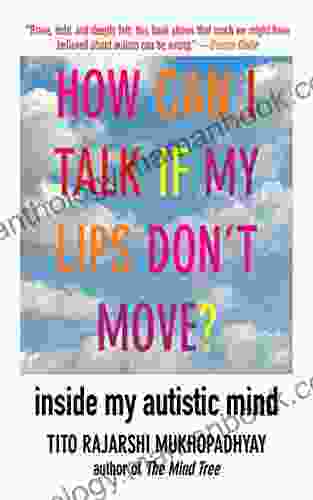
 Peter Carter
Peter CarterInside My Autistic Mind: A Journey of Self-Discovery and...
Autism spectrum disorder (ASD) is a...

 Isaac Asimov
Isaac AsimovA Journey Through Jane Austen's Literary Masterpieces:...
Jane Austen, the renowned English...
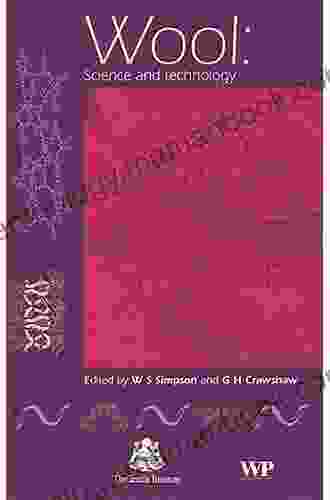
 Hank Mitchell
Hank MitchellAdvancements in Textiles: Science and Technology by...
The textile...
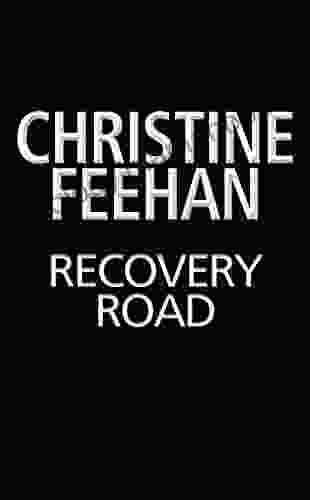
 Troy Simmons
Troy SimmonsRecovery Road: An Odyssey of Hope and Redemption by...
Recovery Road is a...
4.6 out of 5
| Language | : | English |
| File size | : | 10814 KB |
| Text-to-Speech | : | Enabled |
| Enhanced typesetting | : | Enabled |
| Word Wise | : | Enabled |
| Print length | : | 256 pages |
| Screen Reader | : | Supported |
| X-Ray for textbooks | : | Enabled |


